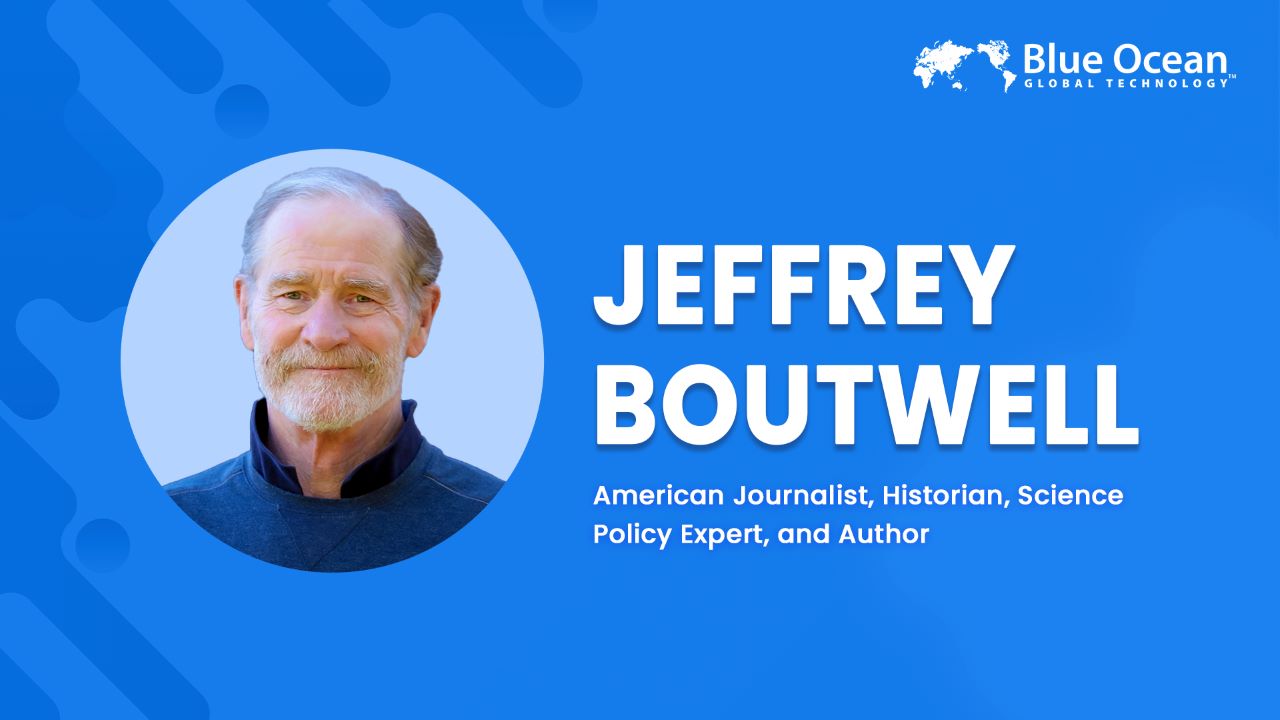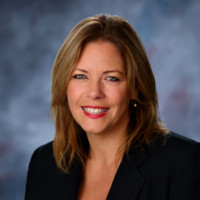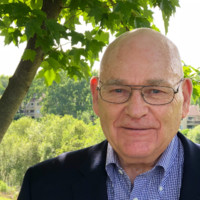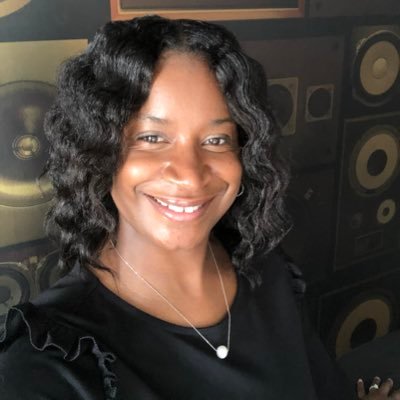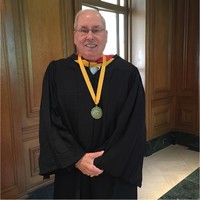About Jeffrey Boutwell

Jeffrey Boutwell is an American Journalist, Historian, Science Policy Expert, and Author. He grew up in Concord, Massachusetts, graduated from Yale University in 1974 with a B.A. in History, then took a job in journalism with the City News Bureau of Chicago. After two years he moved to Berlin to study German, then London where he studied Economics and Politics at the London School of Economics. In 1978 he returned to the U..S. to work on defense and security issues in the Carter administration, after which he moved to Boston where he earned a Ph.D. in political science from MIT. His career for the next 30 years consisted of working on international security issues, first for the American Academy of Arts and Sciences and then with the Pugwash Conferences on Science and World Affairs, which during his tenure received the Nobel Peace Prize in 1995 for its efforts to control and eliminated nuclear weapons. He has traveled to over 50 countries and has published multiple books on nuclear weapons and Middle East security issues. In 2025 he published a biography of his distant family member, George S. Boutwell, a notable American public figure in the second half of the 1900s.. Boutwell now lives in Columbia, Maryland, with his wife, Buthaina Shukri. Other activities in retirement include organizing US-Cuban scientific projects, community volunteer work, seeing all 38 of Shakespeare’s plays currently performed on stage, and taken long-distrance road trips in his Mini Cooper to visit friends and family.
Blue Ocean: Tell us about your professional journey. What inspired you to pursue a career as a foreign policy analyst?
Jeffrey : I grew up in the Boston area and have always loved history, from grade school into high school, reading both history books and historical fiction on U.S. and European history. I majored in European history at Yale University as an undergraduate.
After Yale, I had a brief flirtation with journalism. It was the era of Watergate—Woodward and Bernstein, All the President’s Men. Like many my age, I was entranced by the thought of going into journalism and having a real effect on public policy. After working for a news service in Chicago after college for a few years, I decided that journalism wasn’t for me; I wanted to pursue graduate studies in history.
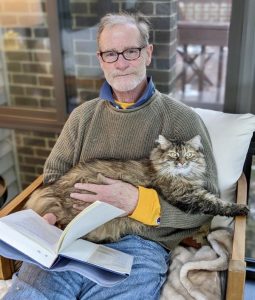
My main interest at the time German history. For the longest time I’ve been fascinated by the extremes characterizing the German people and German culture: the soaring heights of Beethoven and Goethe to the depths of depravity with Hitler and Nazism. Then, I found myself living in Berlin and experiencing what it was like for Germany to be caught in the middle of Europe during the Cold War.
During my time in Berlin in 1976-77, I lived through one of the largest nuclear controversies of the Cold War period – the so-called Euro-missile crisis. Europeans were protesting the deployment of American nuclear missiles in Western Europe as a counter to the Soviet deployment of their SS-20 missiles. Berlin and all of Europe of course were still divided by the Berlin Wall and the Iron Curtain.
In 1977, I was accepted into a master’s program at the London School of Economics where I studied European economics, history, and public policy. I had a tutor at LSE who provided a great contact in the Carter White House which led to an internship on the National Security Council in Washington from 1978 to 1979,thus allowing me to do further work on international security and nuclear weapons issues.
My experiences in Berlin, my studies in London, and then my experience working in the White House all gave me new perspectives on the world of public policy and especially the role of science in the realm of defense and international security. So, in the fall of 1979 I entered the Ph.D. defense studies program at the Mass. Institute of Technology, which combined political science with a heavy dose of science, technology, and nuclear weapons issues. This launched my career for the next 30 years in nuclear weapons policy.
Blue Ocean: Your book, Boutwell: Radical Republican and Champion of Democracy, sheds light on a statesman whose legacy deserves more attention. What led you to focus on writing his first major biography?
Jeffrey : My first interest in ‘retirement’ was U.S.-Cuba relations, given that I helped organize several scientific workshops in Cuba on public health issues while working for the American Academy and Pugwash. In 2014, I had the opportunity to work with marine resource scientists on issues related to the shared waters of the Florida Straits between the two countries. We benefited from the involvement of two of Ernest Hemingway’s grandsons. Most people don’t know that in the 1930s Hemingway used his fishing boat Pilar to collect specimens that today are housed in the Hemingway collection of the Academy of Natural Sciences of Drexel University in Philadelphia.
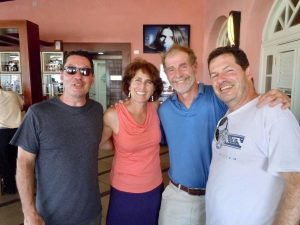
Unfortunately, U.S. and Cuba relations took a real downturn when Donald Trump was elected in 2016, and such programs were no longer possible. I returned to my roots in history and began researching a distant relative of mine, George Boutwell. I had known a bit about George for a long time, even though my family never talked about him and history books rarely mentioned him. As I looked into him, I thought, “Wow, here’s a really significant public policy figure in American history that Americans and even historians know nothing about.”
George Boutwell had a 65-year career in public policy, working closely with Abraham Lincoln and Ulysses S. Grant to promote equal rights for Blacks during the Civil War and Reconstruction. Boutwell helped lead the impeachment of President Andrew Johnson for seeking to block Black equality, and then he opposed Teddy Roosvelt and the annexation of the Philippines after the Spanish-American War. Yet, no one had ever written a full biography on him. As a distant relative, it was even more exciting to work on it. In March 2020 at the beginning of the pandemic, I started my research and writing, and five years later, the book was published.
Blue Ocean: While researching and writing the biography, was there a discovery that shifted your perspective?
Jeffrey : I’ll answer this at both the macro and micro levels. The macro level concerns the fallacies of “Lost Cause Historiography,” which has gained interest in recent years with the killing of George Floyd and the national debate over Confederate monuments in the United States. Why do we have so many monuments throughout the country (especially in the South) that commemorate the Confederate Army and leaders of the Confederacy who were treasonous? They engaged in treason against the country and against our Constitution, violating their constitutional oaths as politicians or military figures.
For the better part of a century, beginning in the late 1800s, Confederate leaders were glorified as having undertaken a noble cause. This was the myth that the Civil War was about states’ rights and not slavery, which was rubbish. But, if they lost the war, they ended up winning the peace, as “Lost Cause” myths dominated Anerican society and culture up through the 1960s and the Civil Rights Movement. In the South you had Jim Crow laws and in the north iron-clad segration, both of which delegated Black Americans to second-class status.
As for George Boutwell, he worked tirelessly first with Lincoln and then with Grant to promote and protect the rights of Black Americans. Even into his 70s and 80s, he was promoting the ideals of an American multi-racial democracy.
In that sense, George Boutwell’s story is one of how history can be “white washed” of the truth. If he were alive today, he would say that much the same is happening now with this emphasis on so-called “patriotic history” being promoted by the entire Trump administration.
At a micro level, one thing I discovered was that “Lost Cause” historiography tried to erase was that efforts to keep Black Americans in a subservient position began immediately after the Civil War. These were the Black Codes that severely restricted the four million newly freed black citizens from getting jobs, owning land and housing, serving on juries, and exercising their voting and political rights. The South may have lost the war, but white supremacists were determined to keep Black Americans in a condition close to slavery.
To counter the Black Codes, Boutwell and political allies such as Thaddeus Stevens and Charles Sumner wrote and enacted the 14th and 15th amendments to the Constitution, protecting black rights. Unfortunately, the Supreme Court over the years diluted those amendments, leaving America’s racial divisions unresolved.
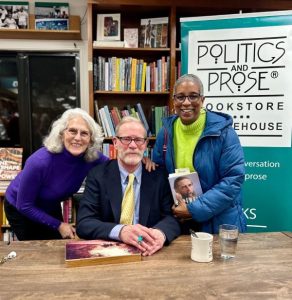
Blue Ocean: As someone involved in the Lincoln Group, what aspects of Lincoln’s leadership continue to resonate with you?
Jeffrey: The best example is Lincoln’s role in emancipation. As a politician in the 1850s, coming from the conservative state of Illinois, he could only go so far in voicing support for emancipation and still hope to be elected in Illinois. So, many people look at Lincoln in the 1850s and say, “Well, he wasn’t really a strong supporter of black rights or emancipation.” But Lincoln was a master of helping shape public opinion and knew that politics is the art of the possible. It’s one thing to make grand pronouncements and idealistic statements, but unless you can implement the policies that carry out those principles, you’re not going to get anywhere. Lincoln, throughout his entire life, was a master of seeing the totality of an issue and realizing what would be possible at any given time.

In 1862, that came together wonderfully with George Boutwell, who, as governor of Massachusetts in the 1850s, was now Lincoln’s Revenue Commissioner helping to raise needed funds for the Union Army. Boutwell had been adamant about calling for black emancipation and enlisting Black Americans in the Union Army. Boutwell made no bones about slavery being the cause of the Civil War—and that emancipation was crucial for Union victory. On August 6, 1862, there was a massive public rally held on the steps of the U.S. Capital with 10,000 people in attendance. George Boutwell was the second speaker that day and he forcefully called for emancipation, something that Lincoln could not yet say as many moderate white Northerners were still unsure about black equality and only wanted to bring the Union back together.
In essence, George Boutwell was putting up a trial balloon for Lincoln, who knew where he wanted to go, but could not say so publicly. Boutwell, on the other hand, said so repeatedly, both in public and to Lincoln. Working as he did in the Treasury Building next to the White House, Boutwell met often with the president and constantly pressed for emancipation. Finally, following the Union’s victory at Antietam in Maryland in mid-September, Lincoln felt free to publicly issue his preliminary Emancipation Proclamation, to take effect on January 1, 1863. Over these key months, when Lincoln was formulating his policy, Boutwell constantly supported the president in moving forward with this monumental step.
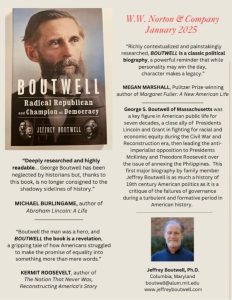
Blue Ocean: What do you think is often misunderstood or underappreciated about Lincoln’s approach to governance, diplomacy, or leadership?
Jeffrey : People don’t fully appreciate all the pressures that Lincoln faced in keeping the Union War effort going. In confronting the eleven states of the Confederacy, who were seizing military installations even before Fort Sumter, Lincoln had to placate the four border states of Delaware, Maryland, Kentucky, and Missouri, so that they didn’t join the rebellion. If they had, it’s more than likely that the Union cause would be lost.
Plus, Lincoln had to keep conservative Republicans and Democrats in the North in line behind the war effort. In 1861 and 1862 there was real fear among white laborers in the North that black Americans freed from slavery would compete for their jobs. Finally, there was the risk that Great Britain might recognize the Confederacy and support if militarily, which would have been a disaster for the Union effort.
Blue Ocean: Over your 30-year career in foreign policy, were there any moments or global events that especially shaped your worldview or your understanding of America’s role in the world?
Jeffrey : Oh boy, I’ll give one positive and one negative. I’m a product of the Vietnam Era, growing up in the ’50s and ’60s. I was a part of the lottery system for the draft in the 1960s and was fortunate enough that I did not have to serve. Looking back now, there’s a part of me that wishes I had served in the military—I would have loved to have joined the U.S. Navy. I love the ocean and would have been happy serving in the Navy in my late teens and early twenties. But during the Vietnam War, the thought of the American military subjugating people 8,000 miles away for misguided political reasons just wasn’t something I could support.
Despite the war being led by people I respected—Kennedy, McNamara, and Johnson—it highlighted the dangers of a superpower like the United States seeing its power as omnipotent. The thought process was that a small country in Southeast Asia would be no match for our military, but of course, that failed. It has failed since in Iraq and Afghanistan, and I just wish this country would better learn the lessons of foreign entanglements—rather than trying to export democracy, countries ultimately need to find their own path.
One of the insights I had in writing the book about George Boutwell was the ability to see how Vietnam and misguided attempts at nation-building trace their origins back to the Philippines after the Spanish-American War. That was America’s first real imperial adventure, sending American troops to put down a Filipino independence movement with disastrous consequences: 5,000 American soldiers killed along with 200,000 Filipino civilians and rebels. Teddy Roosevelt, who I admire greatly, has this one blemish on his record in my mind.
The U.S. desire to annex the Philippines extended to Cuba and Puerto Rico as well. We may not have formally annexed Cuba, but we certainly dominated it politically until 1959 when the Castro Revolution happened. Same with Puerto Rico. Not only do Puerto Ricans not have independence or statehood today, they are second-class citizens despite being part of the American political community.
The positive example of a global event was witnessing the fall of the Berlin Wall in 1989. Having lived in Berlin in the 1970s and experiencing the Iron Curtain firsthand, I came to know a number of East Germans who lived under communism. The fall of the Berlin Wall in November of 1989 and the end of the Cold War was one of the seminal and grand events of my life.
Unfortunately, of course, we soon reverted to Russian-American big-power competition. Yet those brief few years that followed the fall of the Berlin Wall were a magnificent experience in my life, for which I give Ronald Reagan a lot of credit—and I say that as a Democrat who disagreed with many of Reagan’s policies, like the Iran-Contra Affair and supporting the Sandinistas in Nicaragua. But I give Reagan due credit for being one of the architects of dismantling the Iron Curtain and the Cold War.

Blue Ocean: How do you see the lessons from leaders like Boutwell and Lincoln shaping how we approach the challenges facing democracy and foreign relations today?
Jeffrey : I get that question a lot during my book talks: “Tell us what George or Abe would have done today to fix our democracy.” I admit that I can only speak in generalities, but one key thing is “putting principle over party.” We need to adhere to the fundamental constitutional principles that made this country great, such as the separation of church and state, respecting the results of democratic elections, and prioritizing the peaceful transfer of power. These are some of the many foundational ideas that have sustained the American experiment for 250 years.
To move forward in a very complicated world, we have to remember that political parties and ideologies come and go. What matters is that we put principle over party—something George Boutwell greatly believed in. As I describe in my book, George began as a Democrat in the 1840s, coming as he did from a modest farming family in Massachusetts. Not being from elite society in Boston – the so-called “Boston Brahmins” – he supported working class issues. By the 1850s, however, the Democrats supported slavery at the national level, and George was so anti-slavery that he couldn’t stomach it. He left the party and helped create the Republican Party. 50 years later, it was the Republican Party of Teddy Roosevelt that was subjugating the Philippines. In George’s view, America was violating the rights of the Filipino people similar to what white supremacists in the South, and North, were doing to black Americans. George believed that the Constitution should follow the flag. Now, he didn’t necessarily fully support the Democrats at that point, as they were the party of white supremacy in the South, but he believed in telling both white and black Americans that the modern Republican Party was no longer the party of Abraham Lincoln – it had strayed too far in the direction of big business, elite economic interests, and imperialism.
So, his advice was, when you vote, make sure you look at the candidate who best represents your principles, no matter which party they belong to. I think he would say the same today.
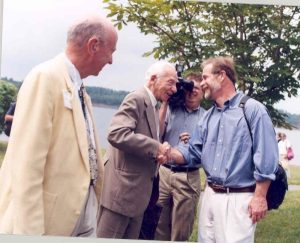
Blue Ocean: Looking back, what were some of the most intellectually rewarding or personally meaningful projects or moments in your career?
Jeffrey : One answer springs immediately to mind. In the 1990s, at the American Academy of Arts and Sciences in Cambridge, Massachusetts, my main focus was on defense, security, and nuclear weapons issues. But we looked at other issues as well, and one of the major ones, from 1990 to 1995, was the creation of an Israeli-Palestinian study group to look at security issues in the West Bank and Gaza.
As we know all too well, the issue of security for the Israeli and Palestinian people is fundamental to any prospect of peace between the two peoples. In the early 1990s, the Oslo negotiations between the Israeli government and the Palestinian Authority appeared to be close to reaching an agreement for an overall political framework for peace. Our small contribution to this was a study group comprised of senior Israeli and Palestinian security, intelligence, and defense officials, all well-connected to their governments. I was a co-chair of the group, which met in secret in London and Rome, and took the lead in drafting a report which would have to be agreed to by all the members of the group. It was then published by the American Academy, laying out the steps needed to created mutual security in the final status negotiations for the West Bank, Gaza Strip, and Israel.
You can imagine what an experience it was working with senior Israeli defense and intelligence officials, men who had fought in the 1967 and 1973 wars, as well as with senior Palestinian advisers to Yasser Arafat involved in what they saw as a national liberation struggle. Now, they were sitting together, trying to find common ground. Although our group reached agreement on many sensitive security issues, the whole process of Israeli-Palestinian peace imploded when Prime Minister Itzhak Rabin was assassinated by a Jewish fanatic in November 1995 in Tel Aviv. As both a military hero and respected political leader, Rabin was one of the few figures in Israel who could lead the country to a peace agreement with the Palestinians.
Following Rabin’s death, the hard-line nationalist Benjamin Netanyahu came to power, and the rest is history. Thirty years later, the prospect of a two-state solution for Israeli-Palestinian peace seems gone. Looking back, I’ll never forget driving near my house in Massachusetts on that November morning and hearing the news that Rabin was dead. I sensed immediately that Israel had lost its best chance for reaching an equitable peace agreement with the Palestinians.
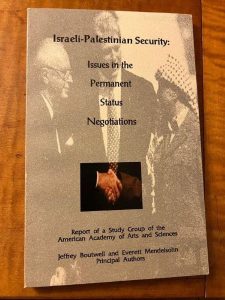
Blue Ocean: What are some misconceptions the public often has about how foreign policy decisions are made, or about the people behind them?
Jeffrey : This is probably the most difficult question. I have to say that the public doesn’t have misconceptions about how foreign policy is made—they just don’t understand it. They don’t understand the incredible complexity of what American leaders have to deal with, whether it’s in the Middle East, Russia, or Ukraine; the American people remain insular, concerned primarily with domestic issues. To some extent, that’s true in every country—I’m not saying it’s unique to the American people—but it’s more pronounced with Americans.
First, we are such a large and self-contained country. Sure, we have Canada and Mexico on our borders, but it’s not as if we’re living in the Middle East or South Asia or the Korean Peninsula, where conflict is a border away. So, Americans are relatively comforted by living in fortress America, protected by two oceans.
Beyond that, if they understand what’s going on, I think the biggest misconception might be that foreign policy is a zero-sum game—that in order for the United States to gain what it wants, somebody else has to lose. Or that if another country “wins”, then America must have lost. There is this idea that if we have to sacrifice something or if we compromise, then it isn’t worth it. Living in an international community as we do, with so many intertwined problems, we are not able to solve them all ourselves. It will take international cooperation with countries (even ones we don’t like or respect). America can only be great if it’s part of a world international community that works to solve collective problems.
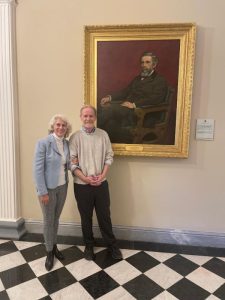
Blue Ocean: What advice would you give to young people who are passionate about making a difference?
Jeffrey : That’s an easy one: public service, the notion of giving back to the country and society that gave you so much. There is little ingrained commitment to public service in our country, and we’re suffering because of it. Think about the concept of national service—I think we should bring back compulsory national service in a heartbeat. It doesn’t necessarily mean in a military sense. It can be a civilian working in a domestic peace corps or public health, but I think every able-bodied American should have to give at least one year of service to this country.
Many other counties have this type of service. I believe that by not having it, we’ve lost what it means to be American. Being too regionally or culturally defined by where we live and who we associate with means that in a diverse country of 350 million people, we have lost our common ground. The best example is during the Second World War, when Americans had to serve in the U.S. Army—kids from Mississippi were meeting kids from the Bronx and all other areas. If we had that again, I think we’d have a stronger national identity, not this fractured politicization that we see today.
Blue Ocean: What hobbies, interests, or routines do you enjoy?
Jeffrey : I love athletics and always have since a little kid. I played football, baseball, and hockey in high school and a little bit in college—I just love being active. I’ve also skied all my life, in addition to playing tennis and golf. At one point, I decided that golf wasn’t strenuous enough, it took too much time out on the course, so I went back to tennis.
Another great project when I retired involved Shakespeare. I’m an absolute Shakespeare nut, so in my first year of retirement, I set out to not only read and watch film adaptations of Shakespeare plays, but also to see all the 36 plays performed on stage today. It took a while—about three or four years—but ultimately, I was able to see them all, many of them several times. “Love’s Labors Lost” was my final play, and I saw it at the Royal Shakespeare Theater in Stratford-upon-Avon in 2014. Many of them I’ve seen four, five, six times; the beauty of the language is just extraordinary. Shakespeare was equally adept at portraying nobility or royalty, whether it was Richard II or Richard III, as he was the barmaids and Falstaffs of the drinking taverns of East London. The range of humanity is remarkable. I tend to throw myself totally into something for three or four years and then move on. So, having done the Shakespeare thing for a while, I began my involvement with U.S-Cuba projects and joint scientific research.
This involved going to Cuba 10 times in the span of four or five years. I’ll never forget the thrill of being there when Obama visited in 2014—when we really thought there was going to be a new page in U.S. and Cuba relations. Unfortunately, this did not happen, much like with the Israelis and Palestinians. When Donald Trump was elected in 2016 and reintroduced hardline US policies, my projects were no longer possible. It was then that I fell into writing the book about George Boutwell.
Through it all, I love taking long road trips in my Mini Cooper. I’m a car nut and have been since my teens. Whether it’s going to car shows, following Forumula One, learning about vintage automobiles, exploring European sports cars, or owning a Mini Cooper for 20 years, I just love driving. My current Mini John Cooper Works is a beast, a hard charging coupe that corners beautifully. It’s great for twisty, windy roads.
Blue Ocean: Is there a quote, perhaps from Lincoln, Boutwell, or your own experience, that has significantly influenced your career and life?
Jeffrey : There are so many Lincoln quotes (obviously), including from his Second Inaugural Address, and the Gettysburg Address, all the way back to his Lyceum speech in Illinois in 1838.
But the quote I’ll give you is from George Boutwell towards the end of his life, as he looked back at all the political battles he had fought: antislavery before the Civil War, emancipatioun during the war, and protecting Black rights through Reconstruction. His goal was to help realize the American dream of a multi-racial democracy, with equal opportunity.
What he said still resonates deeply with me and guides my work on his legacy. He believed that too much power had been given to the state governments. He saw this as a fundamental flaw in the Constitution of 1787.
The Constitution, which organized 13 colonies into the United States of America, was a remarkable and historic document. But among all its virtue in constructing a democratic republican government, a fatal flaw was giving too much power to the states. This was the result of compromising with the Slave Power in the southern states in their quest to preserve slavery.
Following the Civil War, Radical Republicans such as George Boutwell, Charles Sumner, and Thaddeus Stevens fought for the 14th and 15th Amendments to ensure that all Americans would have the same rights and opportunities. This was the so-called “Second Founding,” a new birth of freedom in America. But, white state governments in the South imposed Jim Crow laws that delegated Black Americans to second class status.
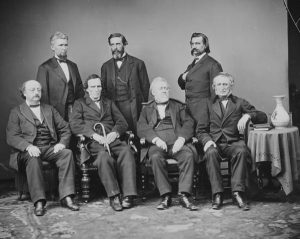
In my book talks, I ask audiences to consider: Why should my rights, privileges, and immunities as an American be determined by the particular state I live in?
I am an American citizen first and a resident of my state second. The American people prize their mobility and their right to live where they want. In my life I’ve lived in eight different states: Georgia, Vermont, Virginia, Illinois, and Massachusetts among others. Should my fundamental rights be any different whether I am living in Virginia or Massachusetts? I want my rights as an American citizen to be recognized no matter what state I am living in.
But that’s not the case. On a range of important issues, politics and law operate differently in our 50 states. I think that’s a fundamental flaw of the American system; we give too much power to the individual states at the expense of the rights and privileges of all American citizens. Many people like to quote Patrick Henry, “give me liberty or give me death.” Well, Patrick Henry also said, even before our war for independence, “I am not a Virginian but an American.”
I only wish that Robert E. Lee had felt the same.
Conclusion
Jeffrey H. Boutwell has led a life like no other. From his undying commitment to international relations and science policies, his career and advice have shaped the world we live in. Jeffrey’s commitment to honoring history and telling the story of his ancestor, George Boutwell, offers a new perspective on the America we know today. You might find Jeffrey advising our next president or just cruising in his Mini Cooper, but no matter where in the world he is, Jeffrey brings his passion, wealth of knowledge, and affinity for lifelong learning with him.
Do you have a personal or professional story that can inspire other people into becoming the best version of themselves?
You are welcome to share your journey with our audience.

